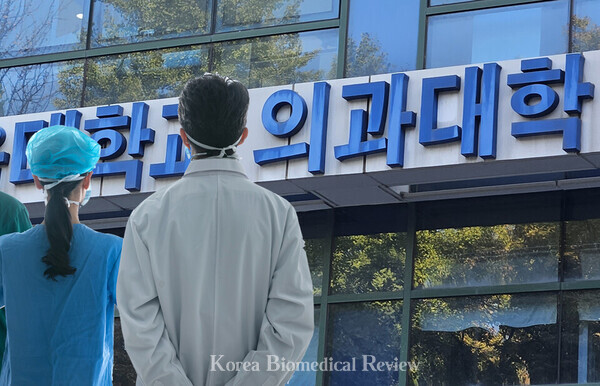More than half of Koreans think the government's decision to increase the medical school enrollment quota by 2,000 was made without scientific evidence.
In addition, more people don’t believe the claim that the increase of 2,000 students was decided by Minister of Health and Welfare Cho Kyoo-hong than those who do.

These are the results of a survey on the expansion of medical school admissions commissioned by the Medical Professors Association of Korea (MPAK) on polling firm Media Research among 1,001 adults nationwide from Monday to Tuesday (with a sampling error of ±3.1 percentage points at the 95 percent confidence level).
According to the survey, the government and the medical community are to blame for the prolonged doctor-government conflict. Some 47.1 percent of respondents said the government was to blame for the medical vacuum while 48.8 percent said the medical profession was to blame.
Although Minister of Health and Welfare Cho Kyoo-hong claimed that he decided to increase the number of medical school seats by 2,000, 59.9 percent of respondents did not think this was true, with 24.1 percent thinking it was true.
More than half of respondents believed that the government's decision to increase medical school seats by 2,000 was not based on scientific evidence. While 42.0 percent said there was a scientific basis, 51.8 percent replied there was no scientific basis.
Nearly seven in 10 Koreans favor a gradual increase in medical school seats. Of those who favored a quota increase, 63.0 percent favored a gradual increase, while 28.8 percent favored a one-time increase.
"The public opinion favors gradual expansion more than twice as much as the current government's one-time expansion proves," the association said. "The number of people who believe that the government's policy to increase the number of medical school students by 2,000 has no scientific basis has also increased."
The number of people who believe that there is no scientific basis for increasing the number of medical school seats by 2,000 is much higher, and the public opinion that the government is responsible for the medical void is also spreading, it added.
Related articles
- 'The health minister isn't the one to make such a bold move to increase 2,000 medical student seats'
- National university hospitals face bankruptcy risk amid $912 mil. revenue drop
- Feeling sorry and helpless, a surgeon chose to fast
- Angry patients took to the street, chanting ‘No patients, no doctors’
- [Contribution] What happened when SNU doubled its medical school admissions in the early 1980s
- 96% of medical students to boycott state medical exams: survey
- Korea's pediatric emergency medicine faces collapse amid physician exodus

